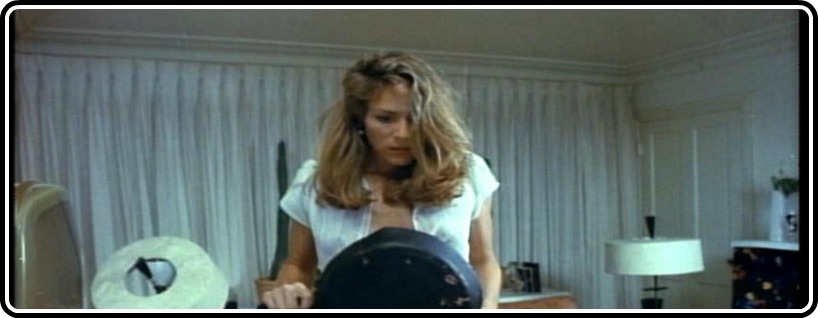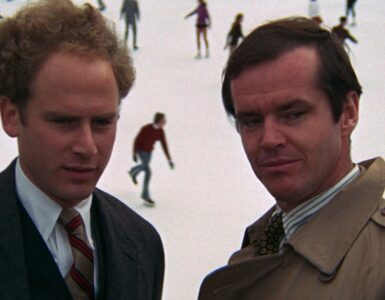Sure, the Criterion Collection, a bastion of high art pieces of cinema are chock full of the most artistic and influential pieces of film. Films from the French New Wave. Films from Tarkovsky, Godard, Bergman, Kurosawa. They also have films from the modern legends. Fincher and, recently, Christopher Nolan are great examples. However, they sure as hell love themselves some cult films.
From Hausu to Carnival Of Souls, genre pictures have more than their fair share of support within the ranks of the mighty Criterion Collection, and a new member has joined them. Paul Bartel’s iconic cult picture Eating Raoul has finally arrived on Criterion Collection DVD and Blu-ray too much appreciation from the cult movie set.
A rather blunt and heavy-handed, but still immensely scathing, satire, Eating Raoul follows the story of a couple who, with the hopes of getting themselves free of a group of swingers living in their housing complex, decide to take some drastic actions. With some ingenuity the pair decide to find some clients looking for a good time, only to take them out with a good shot to the head with a frying pan. Using the money they gain to try to get themselves a building to turn into the restaurant they have always wanted to start, Eating Raoul is billed as one of the strongest instances of the door closing on the sexual revolution. Taking a relatively campy approach to its satire, Eating Raoul is truly a fine film, but given the bluntness with which its satire is handed, that is a bill it isn’t quite able to live up to.
Both one of the film’s stars and its director, Paul Bartel is the major voice seen here. The film is best described as a slapstick satire blending some really solid physical comedy with brutally in your face satire. Subtlety is not in this film’s, or Bartel’s, vocabulary and it’s ultimately the film’s major flaw. A black comedy at its heart, the film ultimately is too aggressive in its angst towards the ‘free love’ set, and while no character finding themselves in the crosshairs of our two leads is considered likeable, their characteristics are cartoonish and over the top. Without any sense of delicacy taken with the narrative or its themes, Bartel ultimately turns what could be a fantastic pitch black comedy into a heavy handed and laugh-free meditation on this nation’s sexual revolution that is completely underscored by a rather dull finale.
That said, the performances here are quite fun. Bartel is great here as a doting husband to his co-star and Andy Warhol muse Mary Woronov, who is equally great here as the sexy-but-not-sexual nurse turned murderer. Their relationship is really entertaining, and where much of the film’s comedy doesn’t work due to its bluntness, when the two share the screen it’s really quite charming. Robert Beltran stars as Raoul, and he’s rather forgettable, as is much of this film’s supporting cast. Faces like Ed Begley Jr. pop up for a scene or two here, and while it’s interesting to see really great character actors pop up occasionally, the film itself doesn’t give us any depth to any of the couple’s victims to really make Paul and Mary’s career choice feel real and palpable.
That all said, Criterion’s treatment of this film is more than superb. The transfer is top-notch, both visually and audibly, really adding a lot to this release. The film itself is intriguingly made, with the slapstick bits often times being creatively crafted either visually or via some really fun and funny sound design. A commentary is featured here with writer Richard Blackburn, designer Robert Schulenberg and editor Alan Toomayan that is insightful, and the making of documentary is absolutely top-notch. Toss in a fun, if rather uninteresting, gag reel and two short films from Bartel (The Secret Cinema and Naughty Nurse) and you have a release chock full of context that makes this one hell of a worthwhile purchase for fans of Bartel and his types of films. The film itself may not, and truly isn’t, the groundbreaking black satire that it tries so hard to be, but this release is a beautifully rounded out bit of context looking at an era of American cinema that has yet to get the true-blue respect that it so deeply deserves. Fans of the film and this filmmaker will be hard pressed to find a better release.





![Bergman Island (The Criterion Collection) [Blu-ray]](https://criterioncast.com/wp-content/uploads/2022/11/bergman-island-the-criterion-collection-blu-ray-400x496.jpg)
![This Is Not a Burial, It’s a Resurrection (The Criterion Collection) [Blu-ray]](https://criterioncast.com/wp-content/uploads/2022/11/this-is-not-a-burial-its-a-resurrection-the-criterion-collection-blu-ray-400x496.jpg)
![Lars von Trier's Europe Trilogy (The Criterion Collection) [The Element of Crime/Epidemic/Europa] [Blu-ray]](https://criterioncast.com/wp-content/uploads/2022/11/lars-von-triers-europe-trilogy-the-criterion-collection-the-element-of-400x496.jpg)
![Imitation of Life (The Criterion Collection) [Blu-ray]](https://criterioncast.com/wp-content/uploads/2022/11/imitation-of-life-the-criterion-collection-blu-ray-400x496.jpg)
![The Adventures of Baron Munchausen (The Criterion Collection) [4K UHD]](https://criterioncast.com/wp-content/uploads/2022/11/the-adventures-of-baron-munchausen-the-criterion-collection-4k-uhd-400x496.jpg)
![Cooley High [Criterion Collection] [Blu-ray] [1975]](https://criterioncast.com/wp-content/uploads/2022/11/cooley-high-criterion-collection-blu-ray-1975-400x496.jpg)